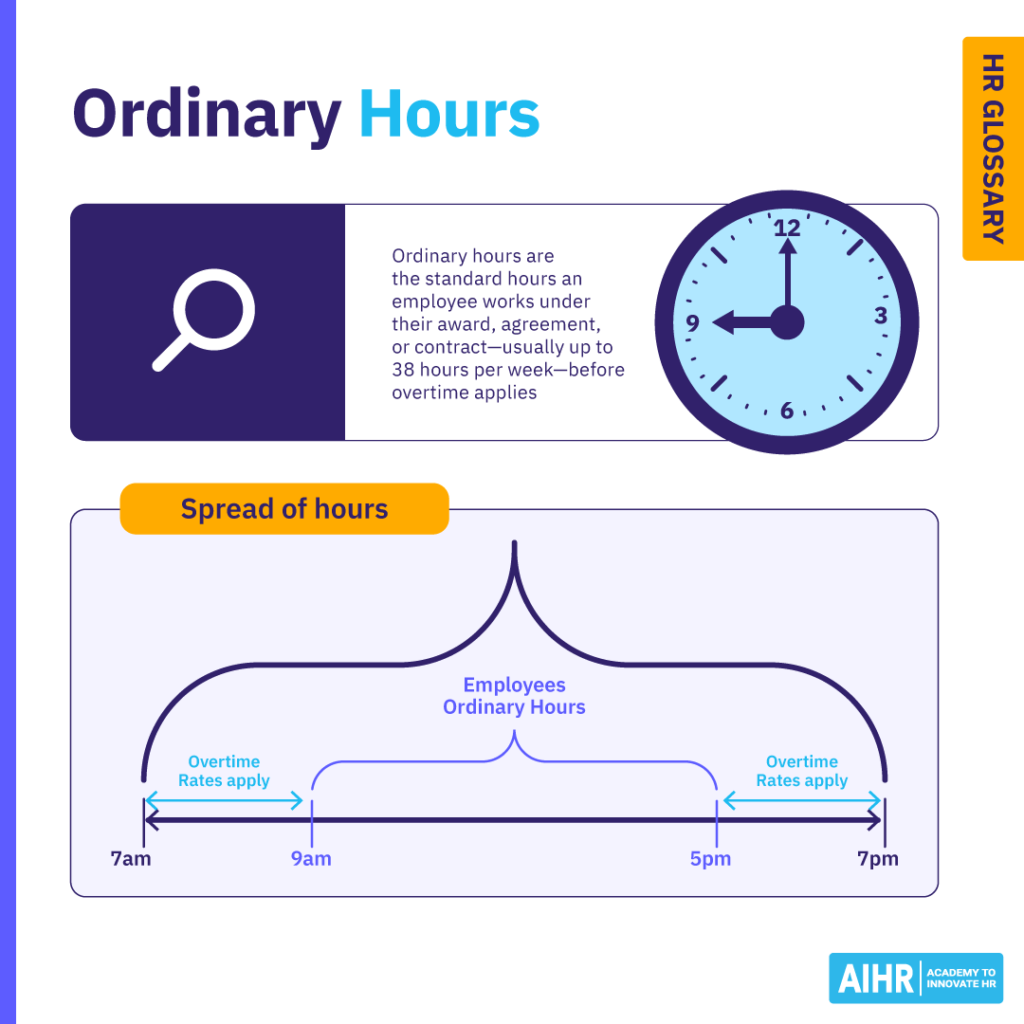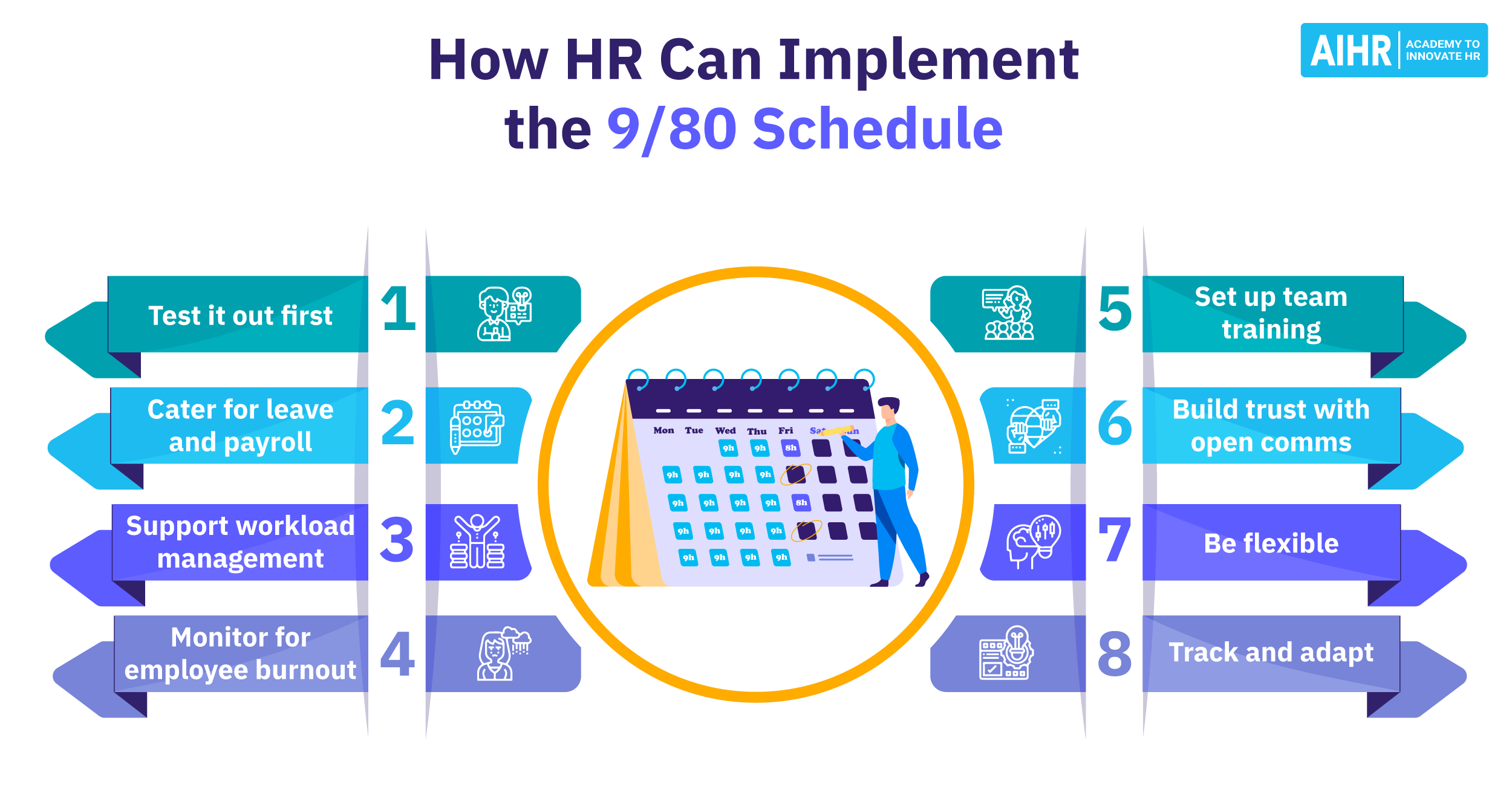Ordinary Hours
What are ordinary hours?
Ordinary hours are the standard hours an employee is expected to work, as agreed between the employer and employee. These are usually outlined in an award, enterprise agreement, or employment contract.
For full-time employees, ordinary hours typically don’t exceed 38 hours per week (plus reasonable additional hours). The specific days and times can vary depending on the applicable industrial instrument and workplace practices. Ordinary hours also serve as the basis for calculating entitlements, such as leave and penalty rates.

What is considered ordinary time?
In Australia, ordinary time refers to the standard work hours agreed upon between an employer and employee, excluding overtime. These hours are crucial for determining entitlements like leave, public holiday pay, and overtime rates. The specifics depend on the employment type and the applicable agreements.
Full-time employees
Full-time employees generally work 38 hours per week. These can be averaged over a period if allowed by the relevant award or agreement. Hours worked beyond 38 are usually considered overtime, unless specified otherwise.
Part-time employees
Part-time employees work less than 38 hours per week, with their ordinary hours agreed in advance. Leave and other entitlements are calculated on a pro-rata basis. Any changes to the total number of ordinary hours require mutual consent and may necessitate a formal contract update.
Other agreements: Modern awards, enterprise agreements, and employment contracts
- Modern awards: Ordinary hours for specific industries or occupations, including when these hours can be worked (e.g., spread of hours). They may allow some flexibility—such as paying additional hours at ordinary rates within limits.
- Enterprise agreements: Custom workplace agreements that can define different ordinary hours or conditions for working them. These agreements must comply with the National Employment Standards (NES).
- Employment contracts: Can include specific terms about ordinary hours as long as they meet or exceed award or NES minimums. A written contract is always recommended to avoid disputes.
Did you know?
Record increase in hours worked correlates with productivity decline
In 2022–23, Australia recorded a 6.9% rise in hours worked, the highest annual increase in history. However, this did not translate into economic output, as labor productivity fell by 3.7%, well below the long-term average growth rate of 1.3%. This highlights that while ordinary hours are foundational for employment structures, excessive or mismanaged additional hours can negatively impact individual efficiency and overall economic performance.
Can employees work more than 40 hours a week in Australia?
Yes, employees can work over 40 hours a week in Australia if the additional hours are reasonable under the Fair Work Act 2009. Full-time employees may work 38 ordinary hours plus reasonable additional hours, typically paid at overtime rates unless an award, enterprise agreement, or contract states otherwise.
The table below outlines the key differences between ordinary hours and overtime to help clarify how each applies in the workplace.
Definition
Standard agreed working hours (usually up to 38/week).
Additional hours worked beyond the ordinary hours.
Limits
Capped at 38 hours/week (plus reasonable additional hours).
No fixed cap, but must be reasonable and safe.
When it applies
During agreed spread of hours under award or agreement.
Outside of ordinary hours or agreed spread of hours.
Applies to
Full-time and part-time employees within set hours.
Employees working beyond agreed or award-specified hours.
Entitlements
Used to calculate leave and superannuation.
May include additional entitlements like penalty rates or time off.
Example
9 a.m. to 5 p.m., Monday to Friday (total 38 hours).
Working until 8 p.m. or on Sunday, outside the agreed spread of hours.
What are reasonable additional hours?
Under Section 62 of the Fair Work Act 2009 (FW Act), reasonable additional hours are those worked beyond the standard 38 hours per week for full-time employees. Employees have the right to refuse additional hours if they’re deemed unreasonable.
Factors determining reasonable additional hours
The FW Act outlines criteria to determine if additional hours are reasonable. These include:
- Health and safety risks: Consideration of fatigue, stress, or other risks to the employee’s wellbeing.
- Employee’s personal circumstances: Family responsibilities or other commitments outside work.
- Workplace needs: The operational requirements of the employer’s business or industry norms.
- Compensation or notice: Whether the employee is compensated (e.g., overtime pay) and whether adequate notice was given for the request.
- Employee role and responsibility: Higher-level roles may expect more hours, especially if remuneration reflects this.
- Averaging provisions: Agreements allowing the averaging of hours across weeks may influence reasonableness.
- Other relevant matters: Any other factors specific to the employee or workplace context.
Employee right to refuse unreasonable hours
Employees can refuse to work extra hours if the request is unreasonable. Employers must consider their legal duty to ensure a safe working environment and prevent fatigue or overwork. They are also not allowed to take adverse actions (e.g., termination or demotion) against employees for refusing unreasonable hours.
The law in action
The case of Australasian Meat Industry Employees Union v Dick Stone Pty Ltd shows the legal risks of requiring excessive employee hours without compensation. Mr. Samuel Boateng, a recent immigrant employed by Sydney-based Dick Stone Pty Ltd, was contracted to work 50 hours per week starting at 2 a.m. without overtime pay or knowledge of his entitlements under the Meat Industry Award 2010 or the Fair Work Act 2009.
The Federal Court found the employer to be in breach of multiple obligations, including failing to pay overtime, maintaining unsafe and unsociable working conditions, and neglecting to issue the Fair Work Information Statement. Justice Katzmann ruled that the additional hours were unreasonable, citing the health and safety risks, heavy workload, and lack of compensation. The company was fined $93,000.
Key HR considerations for ordinary hours
Maximum weekly hours
- Full-time employees can work a maximum of 38 ordinary hours per week plus reasonable additional hours.
- Part-time employees must have agreed ordinary hours under 38 hours.
- Any extra hours must be reviewed for reasonableness under Section 62 of the Fair Work Act.
Spread of hours
- The spread of hours refers to the timeframe during which ordinary hours can be worked without attracting overtime.
- These hours are defined by relevant modern awards, enterprise agreements, or employment contracts.
- For example, an award may specify that ordinary hours must fall between 6 a.m. and 6 p.m., Monday through Friday. Work outside this is generally considered overtime.
Averaging hours
- Some awards or agreements allow ordinary hours to be averaged (e.g., 38 hours per week over four weeks).
- If not covered by an award or agreement, this must be agreed upon in writing.
- Averaging helps manage seasonal or fluctuating workloads while maintaining compliance.
Agreement-free employees
- For employees not covered by a modern award or enterprise agreement, the National Employment Standards (NES) apply.
- HR must ensure hours do not exceed 38 per week (plus reasonable additional hours) and all entitlements are provided.
- Employment contracts should clearly define ordinary hours and expectations around flexibility and overtime, even without an award.
Part-time and casual employees
- Part-time employees must have set ordinary hours agreed upon in writing.
- Casual employees aren’t guaranteed ordinary hours, but a regular pattern of work may create entitlement expectations.
Documentation and communication
- Clearly outline ordinary hours in employment contracts, including provisions for flexibility, overtime, and spread of hours.
- Ensure employees receive the Fair Work Information Statement and understand how their ordinary hours are determined.
FAQ
Ordinary hours of work are the regular hours an employee is expected to work under their award, enterprise agreement, or employment contract—typically up to 38 hours per week for full-time employees, not including overtime.
Yes, a 40-hour week is legal in Australia if the extra hours are considered reasonable additional hours under the Fair Work Act. Full-time employees typically work 38 ordinary hours plus reasonable extra hours, often paid as overtime.








